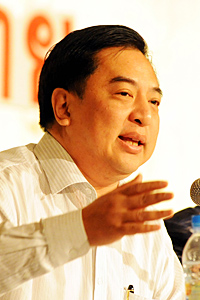
The military government's reconciliation forum has been well-received by political parties. The Democrat Party has agreed to join while the Pheu Thai Party has not taken its usual belligerent position against the proposal. They will eventually cave in. No one wants to miss the train.
They have no choice but to fall in line with the military. They want to participate in the general election, which has been moved to early next year. Some of those who have been out of a job for almost three years will no doubt be enticed by the perks and privileges of a political position.
But there are political idealists who believe a return to democracy, even under a limited and illiberal constitution, is better than having a military government.
For them, an election could lead to a power sharing platform with the military while giving them the chance to still represent their constituencies. They believe that the path could even lead to democratic reforms.

Suranand Vejjajiva was secretary-general to the prime minister during the Yingluck Shinawatra government and is now a political analyst.
But this is wishful thinking.
Building a road to gain leverage with the military regime is difficult. Their shortcomings over the past decade have given military leaders the legitimacy to rule. The public have lingering doubts about their involvement in corruption allegations, prolonged and violent street protests and the misuse of airwaves to broadcast propaganda and hate speech.
As long as the political class fails to get their act together and provide society with an alternative, democracy will continue to lose.
These shortcomings must be addressed. But a return to a sustainable democratic process requires strong drive from politicians. Political parties must not run in elections merely to serve their own interests. They need to offer policies that benefit the majority of people and choose leaders who are willing to implement those policies. They must work hard to regain the public trust, not to become puppets of those who dangle financial incentives or turn into lackeys of the military regime.
That is why political parties need reform. Their line of thinking on these key issues must be changed.
The first one is on reconciliation. Political parties need to clearly articulate the terms of reconciliation, a process which must be based on truth; the truth about what happened to those who died or were injured during politically motivated violent clashes must be revealed. Families must be able to get an explanation for why their loved ones died, and find justice.
Even though the reconciliation process is not to point fingers and pass on the blame, political leaders must be held accountable and the culprits must be put on trial in a fair, transparent and proper way.
This includes security officers who are found to have been involved in violent crackdowns on political protesters during the past decade.
Moreover, the reconciliation version for politicians must not be based on any superficial mentioning of principles to please the military in the hope of political gains with regard to the election. Elections without justice being served for past crimes will only open old wounds and ignite more conflict.
The main political parties in the conflict, the Pheu Thai and Democrats, must clarify their positions on the red-shirt United Front for Democracy against Dictatorship (UDD) and the People's Democratic Reform Committee (PDRC) Foundation. Are they going to use the same tools, such as street protests, to further their political gains or are they willing to integrate them into the mainstream political party process?
With the framework and agenda set by the military regime, reconciliation could turn out to be just a charade for military leaders to prolong power until after an election. Sadly, political parties could become part of a coalition that supports the regime's continued existence. The people thus may be left behind.
The second issue is the reform agenda. The government is setting the tone for reform with its 20-year strategic plan driven by technocrats.
But political parties only criticise the day-to-day policies of the government without proposing an alternative platform to the government's model. They merely offer noise to fill the air and words to fill the newspapers.
Additionally, they must not resort to the excuse that the regime prohibits political activities. If political parties do not stand up to protect the rights and liberties of the people, they are taking their constituents for granted.
The Pheu Thai Party itself needs to look back at the political legacy of the now-dissolved Thai Rak Thai Party (TRT) and be reminded of how the TRT's former leader, Thaksin Shinawatra, established the party.
He has been credited for the way in which he put all political factions into one party and breathed life into it via ideas and policy platforms which were at the time new and progressive.
The reform agenda proposed by the Pheu Thai Party should address the disadvantaged while finding the voices of the urban middle class, in the the same manner as the TRT did in the past.
The Democrats also need to develop their own agenda. Playing the usual political game of compromising with the elites and the military will only speed their demise.
The third is corruption. Political parties must propose a process whereby they select the best people to run in elections.
The integrity of a party's representatives must be impeccable. They must also institute a viable mechanism to prevent corruption and punish those involved. Their main social contract with the public is their commitment to protect the public interest without any excuses.
Lastly, political parties must function democratically. That means party members must have a real say in decision-making processes.
If political parties are not democratic at the core, it will be hard for anyone to believe they have the ability and will to protect democracy.
